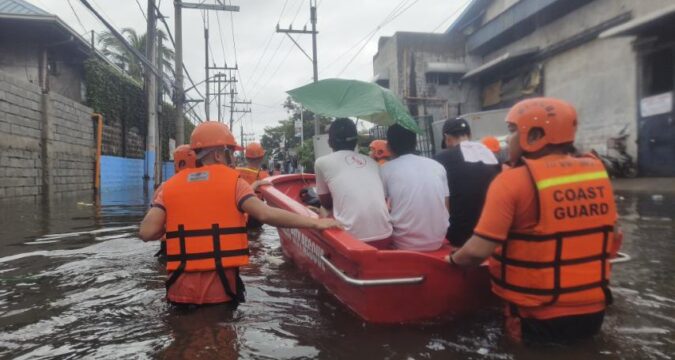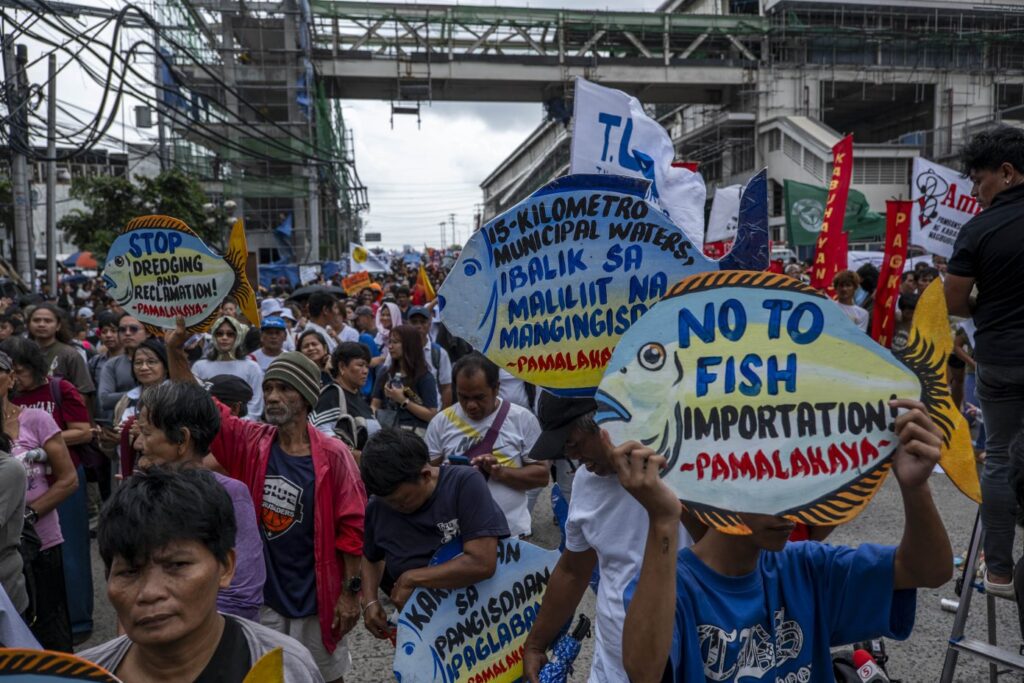
MANILA (LiCAS News): Environmental and climate justice groups criticised the fourth State of the Nation Address [SONA] of Philippine president, Ferdinand Marcos Jr., on July 28, calling it a “missed opportunity” that failed to confront the country’s worsening climate and energy crises.
Father Edwin Gariguez, lead convenor of Protect Verde Island Passage, said, “It’s disappointing to hear President Marcos peddling natural gas as a clean energy source.”
The priest said fisherfolk, especially in areas of gas expansion in the country, “suffer from the destructive impacts of massive natural gas development on their livelihoods and the marine ecosystem.”
Father Gariguez added that the plight of small fishing enterprises “was treated as a mere footnote,” reduced to “a passing mention of fiberglass boat turnovers” while urgent issues such as the Supreme Court ruling on municipal waters, “which fishing families bewail,” were ignored.
He also criticised the absence of “any meaningful reflection on the first major environmental crisis of his administration, the 2023 oil spill in Mindoro.”

Photo by Mark Saludes/LiCAS News
The SONA centred on accomplishments and initiatives, but was notably filled with stern warnings, particularly on government infrastructure projects like flood control, indirectly highlighting his administration’s shortcomings, according to the Inquirer.
Marcos Jr. did acknowledge the flooding caused by recent storms saying, “I clearly saw that many flood control projects were failures and collapsed, and some were just imaginary.”
He called out those responsible—without naming names, saying,“Have some shame for the households that were swept away or submerged by the floods. Have some shame, especially for our children who will inherit the debts you made, while you just pocketed the money.”
In pastoral letter, Pablo Virgilio Cardinal David, president of the Catholic Bishops’ Conference of the Philippines, blasted corruption and called for concrete action, according to CBCP News.
As we celebrate the 500 years of Christianity in the Philippines. The Chaplaincy to Filipino Migrants organises an on-line talk every Tuesday at 9.00pm. You can join us at:
https://www.Facebook.com/CFM-Gifted-to-give-101039001847033
“We are told it’s climate change, yes, climate change is real, and it is devastating,” he wrote. “But let us be clear: the real disaster here is corruption. The very funds meant to protect our people have been siphoned off by systems that enrich the few and endanger the many. We must name this for what it is: a sin against the poor, a betrayal of public trust, a mockery of justice.”
John Leo Algo, deputy executive director of Living Laudato Si’ Philippines, said the speech reflected “business-as-usual.”
We are told it’s climate change, yes, climate change is real, and it is devastating. But let us be clear: the real disaster here is corruption
Cardinal David
Algo said, “It seems he is more intent about maintaining his public image and subtly throwing jabs at his political opponents than directly addressing the grim picture that seems so obvious to everyone else.”
He noted that Marcos Jr. appeared to engage in political greenwashing, pointing out that he omitted references to his administration’s earlier promotion of nuclear and gas projects, focusing only on renewable energy.
Gerry Arances, convenor of the Power for People Coalition, noted that Marcos “hit the mark” in admitting high electricity costs and unreliable service but warned that “acknowledgement is pointless if the root cause of power woes—reliance on costly and unsustainable energy from fossil fuels—stays the status quo.”
Arances stressed that including coal and gas in the 200 power plants targeted by Marcos Jr. for the remainder of his term would not solve the country’s energy problems. He urged the government to remove barriers to the rapid development of renewable energy and ensure that such initiatives deliver direct benefits to consumers and communities.
The Philippine Movement for Climate Justice said that Marcos Jr. “placed his bets on the same failed strategy: inviting big businesses to lead the development.” It warned that this “model, reliant on private investment and dirty projects… has kept millions in the dark and driven up electricity prices.”
President Marcos framing worsening disasters as ‘new normal’ sounds like an admission of the administration’s lack of will to properly address the impacts brought about by the climate crisis
Krishna Ariola
Jaybee Garganera, national coordinator of Alyansa Tigil Mina, criticised Marcos’ silence on mining. “We totally reject [Marcos Jr.] and his SONA because there is hardly any mention of planned programmes and policies concerning the environment, and destructive mining,” he said.
Krishna Ariola, energy and climate programme head of the Centre for Energy, Ecology and Development, said, “President Marcos framing worsening disasters as ‘new normal’ sounds like an admission of the administration’s lack of will to properly address the impacts brought about by the climate crisis.”
The Institute for Climate and Sustainable Cities also called for “greater urgency” in climate action. Executive director, Angelo Kairos dela Cruz, said, “These pronouncements signal that we are on the right track.”
He added, “However, we underscore the need for more urgency in integrating climate action and more tangible solutions in the country’s long-term development strategies.”
Dela Cruz emphasised that scientific evidence shows climate impacts will continue to worsen, stressing the need to protect communities and equip them with tools and strategies to adapt.
Only prior to the SONA, Caritas Philippines pressed the Philippine president to take real action saying, Filipinos continue to suffer the impact of climate-related disasters while government action remains inadequate.
“In 2024, the president declared the climate crisis a national priority. But one year later, very little has changed. In fact, actions have often contradicted these promises.”
It cited continued mining and reclamation activities, forest degradation, and the displacement of Indigenous communities. “Massive reclamation projects continue. Large-scale mining permits are still being issued. Our forests continue to vanish alarmingly,” it said.








